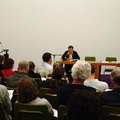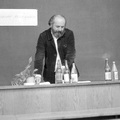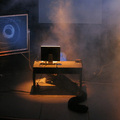Summit - The project was organized by a collective—Irit Rogoff (London), Florian Schneider (Munich), Nora Sternfeld (Vienna), Susanne Lang (Berlin), Nicolas Siepen (Berlin), Kodwo Eshun (London)—and in collaboration with the HAU theatres, Unitednationsplaza, BootLab, and the Bundeskulturstiftung, all in Berlin.
That initial project within the spaces and parameters set by the museum [Van Abbemuseum] led several of us to think about taking those questions into a less regulated and prescribed space, one in which institutional practices could encounter self-organized, activist initiatives. This led to SUMMIT Non-Aligned Initiatives in Education Culture (www.summit.kein.org), a forum which took place in Berlin in May 2007.
In a sense, we came together in the name of “weak education,” a discourse on education that is non-reactive, and does not seek to engage in everything that we know fully well to be wrong with education—its constant commoditization, its over-bureaucratization, its ever-increasing emphasis on predictable outcomes, etc. If education is forever reacting to the woes of the world, we hoped to posit that education is in and of the world—not a response to crisis, but part of its ongoing complexity, not reacting to realities, but producing them. Often these practices end up being low-key, uncategorizable, non-heroic, and certainly not uplifting, but nevertheless immensely creative.
Why education and why at that particular moment?
This focus on education provided a way to counter the eternal lament of how bad things are—how bureaucratized, how homogenized, how understaffed and underfunded, how awful the demands of the Bologna Accord are with its homogenizing drives, how sad the loss of local traditions is, etc. Though not without its justifications, this voice of endless complaint serves to box education into the confines of a small community of students and education professionals. How, then, to paraphrase Roger Buergel, can education become more? How can it be more than the site of shrinkage and disappointment?
And why at this particular moment? Because, with Bologna and all its discontents, this moment is also seeing an unprecedented number of self-organized forums emerging outside institutions, as well as self-empowered departures inside institutions. Propelled from within rather than boxed in from outside, education here becomes the site of a coming-together of the odd and unexpected—shared curiosities, shared subjectivities, shared sufferings, and shared passions congregate around the promise of a subject, an insight, a creative possibility. Education is by definition processual—involving a low-key transformative process, it embodies duration and the development of a contested common ground.
Here was perhaps one of the most important leaps from Academy to Summit—an understanding of “education” as a platform that could signal a politics, a platform that could bring together unexpected and momentary conjunctions of academics, art world citizens, union organizers, activists, and many others in such a way that they could see themselves and their activities reflected within the broadly defined field of “education.”
At its best, education forms collectivities—many fleeting collectivities that ebb and flow, converge and fall apart. These are small ontological communities propelled by desire and curiosity, cemented together by the kind of empowerment that comes from intellectual challenge. The whole point in coming together out of curiosity is to not have to come together out of identity: we the readers of J. L. Nancy encounter we the migrant or we the culturally displaced or we the sexually dissenting—all of these being one and the same we. So at this moment in which we are so preoccupied with how to participate and how to take part in the limited space that remains open, education signals rich possibilities of coming together and participating in an arena not yet signaled.
Having liberated myself from the arena of strong, redemptive, missionary education, I would like to furnish the field with the following terms:
Notions of potentiality and actualization offer a capacity to replace the reorganization of education with ideas concerning distribution and dissemination. This speaks to an idea that there might be endless possibilities within us that we might never be able to bring to successful fruition. “Academy” becomes the site of this duality, of an understanding of “I can” as always, already yoked to an eternal “I can’t.” If this duality is not paralyzing, which I do not think it is, then it has possibilities for an understanding of what it is about an “academy” that can actually become a model for “being in the world.” Perhaps there is an excitement in shifting our perception of a place of education or training to one which is not pure preparation, pure resolution. “Academy” might instead encompass fallibility, which can be understood as a form of knowledge production rather than one of disappointment.
Equally, I would suggest education to be the site of a shift away from a culture of emergency to one of urgency. Emergency is always reactive to a set of state imperatives that produce an endless chain of crises, mostly of our own making. So many of us have taken part in miserable panels about “the crisis in education.” A notion of urgency presents the possibility of producing an understanding of what the crucial issues are, so that they may become driving forces. The morning after George W. Bush was re-elected president, my classroom moved swiftly from amazement to a discussion about why electoral forums were not the arena of political participation, and what they might actually represent instead—a move from an emergency to an urgency.
Perhaps most importantly, I want to think about education not through the endless demands that are foisted on both culture and education to be accessible, to provide a simple entry point to complex ideas. The Tate Modern comes to mind as an example of how a museum can function as an entertainment machine that celebrates “critique lite.” Instead, I want to think of education in terms of the places to which we have access. I understand this access as the ability to formulate one’s own questions, as opposed to simply answering those that are posed to you in the name of an open and participatory democratic process. After all, it is very clear that those who formulate the questions produce the playing field.
Finally, I would like to think of education as the arena in which challenge is written into our daily activity, where we learn and perform critically informed challenges that don’t aim at undermining or overtaking. When political parties, courts of law, or any other authority challenges a position, it is done with the aim of delegitimizing with a better one, of establishing absolute rights and wrongs. In education, when we challenge an idea, we suggest that there is room for imagining another way of thinking. By doing so in a way that does not overcome the original idea, we don’t expend energy forming opposition, but reserve it for imagining alternatives. At a conference I attended, Jaad Isaac, a Palestinian geographer, produced transportation maps of the Israeli occupation of the West Bank that had an almost mind-blowing clarity to them. It made me think of what gargantuan energies had to be put into turning the evil chaos of that occupation into the crystalline clarity of those maps—energies that were needed in order to invent Palestine. In their pristine clarity, the maps performed a challenge to the expenditure of energies as a response to an awful situation. If education can release our energies from what needs to be opposed to what can be imagined, or at least perform some kind of negotiation of that, then perhaps we have an education that is more.
Irit Rogoff Turning
Links:
Unglamorous Tasks: What Can Education Learn from its Political Traditions? by Nora Sternfeld





